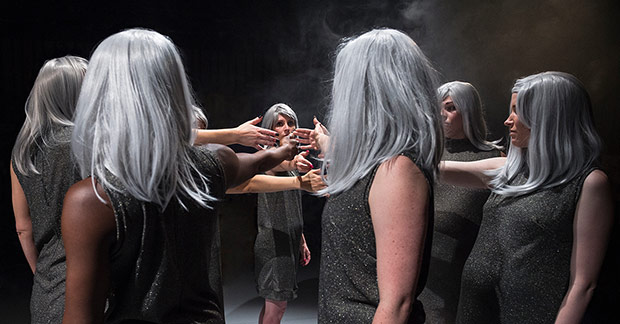
© Foteini Christofilopoulou. (Click image for larger version)
Rhiannon Faith
Smack That (a conversation)
★★★★✰
London, Barbican Pit
12 June 2018
Gallery of pictures by Foteini Christofilopoulou
www.rhiannonfaith.com
www.barbican.org.uk
Rhiannon Faith’s hard-hitting show coats the horrors of domestic violence in the saccharine sweetness of a girly party. We’re invited into the Barbican’s Pit which is transformed into a party space complete with chairs forming a circle, refreshments, music, sweeties, balloons, streamers and presents in neat grey boxes. The welcoming, sassy women called collectively ‘Beverly’ are identically dressed in grey sparkly dresses and wearing long, grey-haired wigs. Already the colour code of the show which is principally grey is a fitting metaphor for the roller-coaster experiences familiar to victims of domestic abuse.
We take our seats clutching our presents, overwhelmed with the hospitality of the performers. They are affectionate and supportive, but I sense their bubbly party spirit is just a façade. For the sake of group participation and anonymity we all take on the collective name ‘Bev’, but are distinguished from the performing Bevs by something that is unique to each of us. I’m holding a glass of red wine so my name tag is ‘Red Wine Bev’.

© Foteini Christofilopoulou. (Click image for larger version)
The party begins. Loud music and high-energy dancing by the women set a defiant tone. After this celebratory opening, each performer stands by a mic and in a light-hearted manner tells us about what to expect, what we can and can’t do. Bev and her doppelgangers warn us that this is no glamorous party, but rather an angry, political piece about ‘intimate terrorism’ – for and about women.
This secure, safe space, which is central to Smack That (a conversation), part of the Barbican’s 2018 season The Art of Change, has been carefully created by Faith and her team to let audience members and each of the performers share what they’ve suffered in a discrete, supportive environment. It’s participatory but not in a scary way, so for example, in between fragments of dance and text we play party games – such as the ‘truth -game in which we have to raise our hands for ‘yes’ or lower them if ‘no’; or the ‘have you ever game’ where we are encouraged to stand up if we ‘have’. Amusing, embarrassing faux pas at social gatherings or on the dance floor gradually blend into sinister abusive realities which cover the territory of sexual abuse, violence, emotional bullying, coercion, manipulation and intimidation.
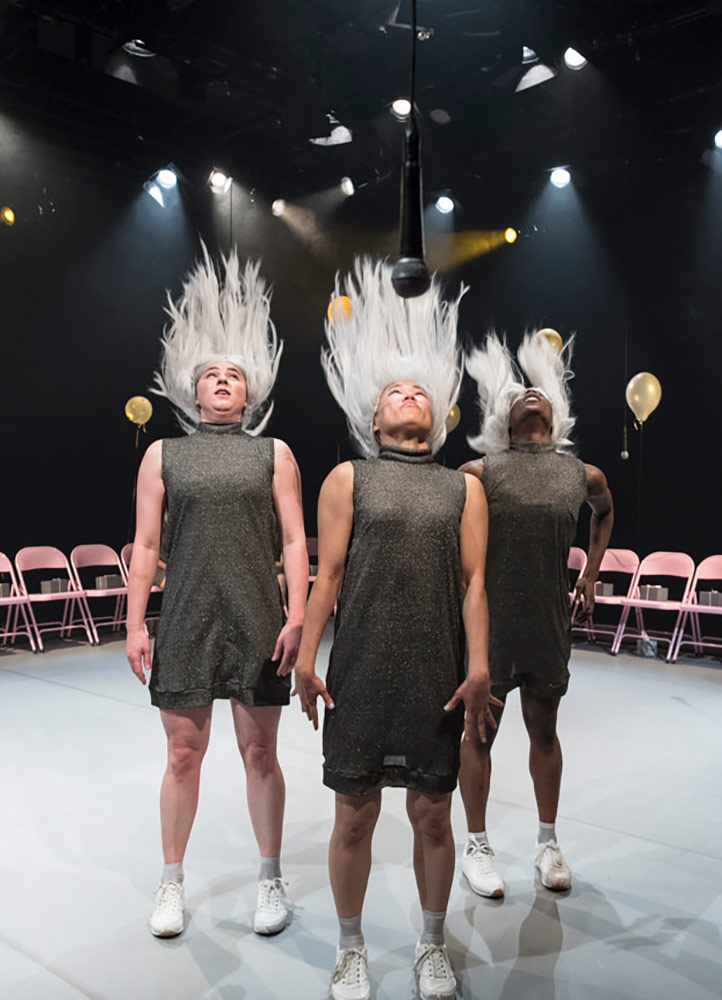
© Foteini Christofilopoulou. (Click image for larger version)
During these games, the flamboyancy of the performers dissipates and the optimistic energy in the room crashes down around us. People reach for the boxes of hankies scattered about on the floor and there’s a break-out space outside the studio complete with a psychologist if needed. But it feels safe and intimate and a place free of judgement or stigma. These emotional dips are always followed by cheerier scenarios: the performers tell jokes or organise a game of pass-the-parcel, offer us refreshments or dance noisy balloon-bursting duets. The rhythm of the show, its dramaturgy and contrasting dynamics are very effective in preventing us from lingering too long in darker moments of reflection.
Each performer through confessional spoken or danced snippets bravely pieces together a visceral jigsaw of painful personal truths: the violence of a father to his daughter, or of a young man to his pregnant girlfriend, shocking sexual exploitation, accounts of being stalked, of emotional black-mail and brainwashing. The worst realisation about these testimonials is that the abusers were at one time loved and cherished partners or parents.

© Foteini Christofilopoulou. (Click image for larger version)
Yukiko Masui performs a thrashingly, desperate solo in which she repeatedly falls to the ground in crumpled poses, while one of the most shocking scenes is where Maddy Morgan holds a cake between her legs and roughly forces Masui’s face into it repeatedly, until she chokes and spits it out.
Further images and conversational text which is spoken in plain, colloquial language inform us that even when an abusive partner has left, the fall-out and recovery process is often harder. The Bevs frequently refer to themselves as ‘debris’, women broken down through degradation, isolation, fear and self-loathing. Yet they are survivors, rebuilding their lives and that message comes through strongly as well.
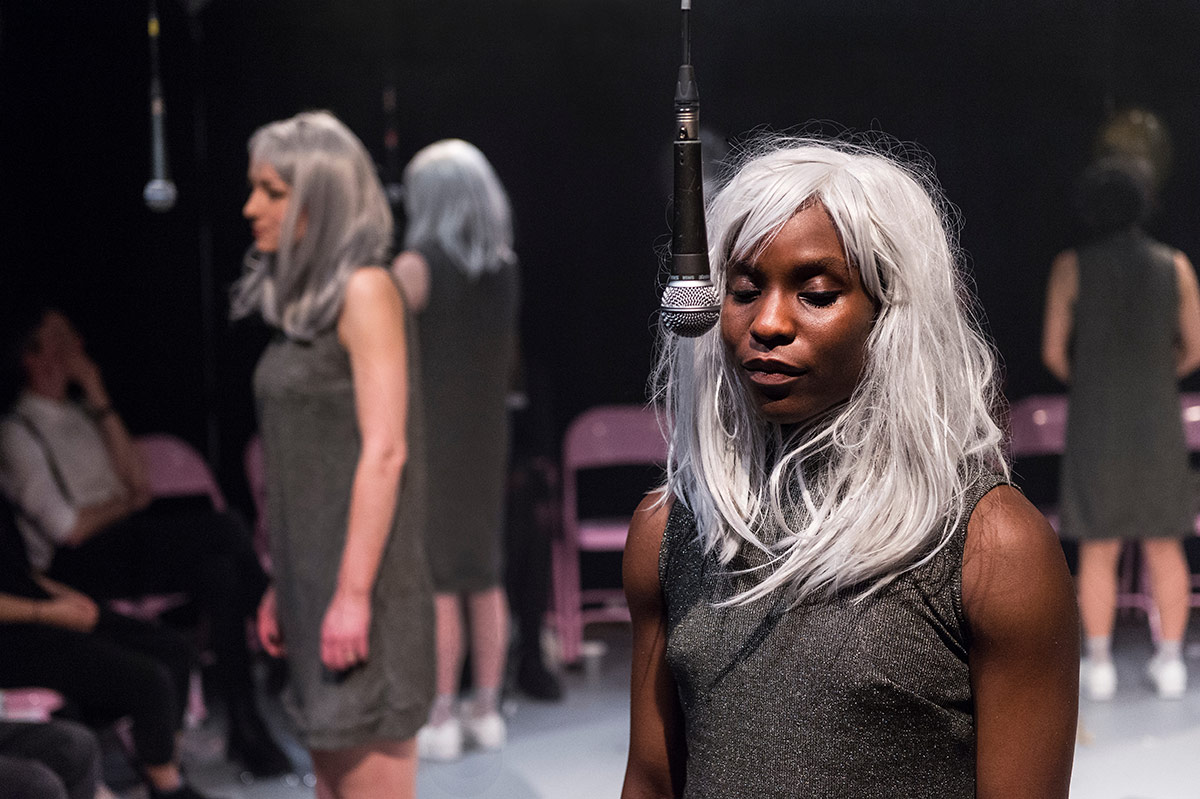
© Foteini Christofilopoulou. (Click image for larger version)
Faith takes risks with her emotive work, but she knows where to put the safety barriers. She’s bold, brazen and doesn’t hold back on explicit language, sexual imagery and unsettling performances, all of which give the show its essential grittiness. Smack That’s theatricality lacks subtlety but treats its subject matter with huge sensitivity and honesty.
We open our presents to discover offers of practical advice, information about help-lines and charities. Faith and the six Bevs don’t leave us stranded in a depressing grey twilight, but give us hope that through such socially conscious theatre which calls us to action we can all lobby for change.

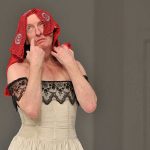




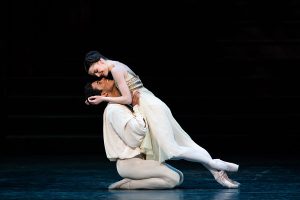


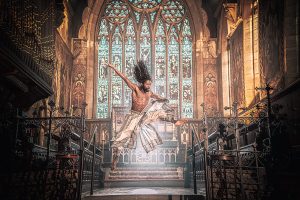

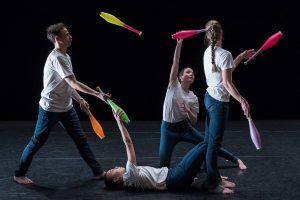

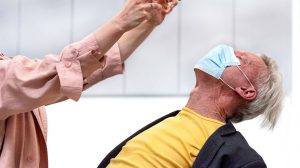
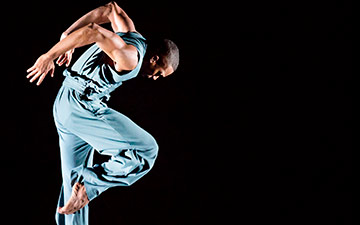

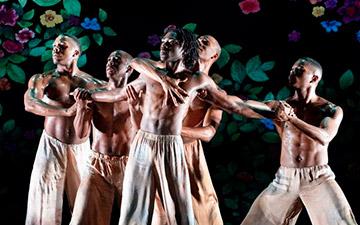
You must be logged in to post a comment.